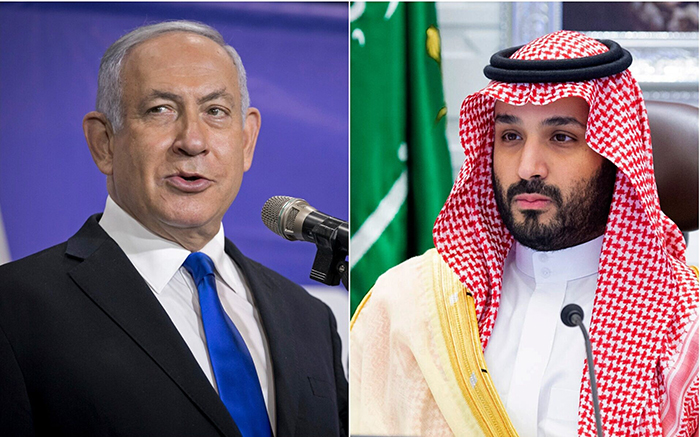U.S. President Joe Biden and Israeli Prime Minister Benjamin Netanyahu pledged on Wednesday to work together toward a landmark agreement to forge diplomatic relations between Israel and Saudi Arabia.
Meeting for the first time since Netanyahu returned to power in December, both leaders signaled a desire to ease strains in their relationship, but Biden also made clear he was determined to discuss their differences.
These included Biden's opposition to Netanyahu’s far-right government’s controversial judicial overhaul plan as well as his concern about Israel’s hard line toward the Palestinians.
"I hope we can get some things settled today," Biden said at the start of the talks sitting side-by-side with Netanyahu in a New York hotel ballroom.
A White House statement issued after the meeting said Biden "reiterated his concern about any fundamental changes to Israel’s democratic system, absent the broadest possible consensus."
Biden also called for "immediate measures to improve the security and economic situation, maintain the viability of a two-state solution, and promote a just and lasting peace between Israelis and Palestinians," the statement said.
Instead of a meeting at the White House, the more prestigious venue preferred by Netanyahu, the two leaders ended up arranging their talks while both attended the annual high-level U.N. General Assembly. Biden invited Netanyahu to visit Washington before the end of the year.
Biden reiterated his commitment to preventing Iran from acquiring a nuclear weapon and also repeated his support for a two-state solution to the Israeli-Palestinian conflict.
But the biggest issue on the agenda was a U.S.-led push to forge diplomatic relations between longtime foes Israel and Saudi Arabia, the centerpiece of broader complex negotiations that involve U.S. security guarantees and civilian nuclear help sought by Riyadh as well as Israeli concessions to the Palestinians.
“I think that under your leadership, Mr President, we can forge a historic peace between Israel and Saudi Arabia,” Netanyahu said. He said "such a peace would go a long way first to advance the end of the Arab-Israeli conflict, achieve reconciliation between the Islamic world and the Jewish state and advance a genuine peace between Israel and the Palestinians."
Netanyahu said they could work together to make history.
“Together,” Biden repeated, signaling his commitment to the normalization effort, which he said would have been unthinkable years ago.
A senior Biden administration official told reporters after the meeting that it was understood that some concessions to the Palestinians must be part of any deal but did not say what those might be.
The official said a normalization deal is still a long way away and that all the leaders involved will have to do "some very hard things" to reach agreement. "There's some way to travel before we get there," the official.
Biden and Netanyahu spent some time meeting one-on-one without advisers, the official added.
Outside the hotel at an anti-Netanyahu protest, Offir Gutelzon of UnXeptable, an anti-judicial overhaul movement, thanked Biden for supporting Israeli democracy. "And we are here to thank you, President Biden, for standing with the People in Israel who want to preserve democracy," Gutelzon said.
WHITE HOUSE SNUB
Netanyahu had expected an earlier U.S. visit given his long history of dealing with American presidents and Washington’s close alliance with Israeli, but Biden had resisted.
Netanyahu did not get a meeting in the early months of the Biden White House in 2021 and was then ousted from power. He returned to power in December as head of a coalition of religious and ultranationalist parties.
Instead, Biden welcomed Israeli President Isaac Herzog, a largely ceremonial post, to the White House in July to mark the 75th anniversary of Israel’s founding.
The talks with Netanyahu were seen as an opportunity for Biden to brief him and try to discern how far Israel would be willing to go in what has been billed as a potential grand bargain that could reshape geopolitics in the Middle East.
Netanyahu’s government has shown little willingness to make major concessions to the Palestinians, which could make it hard for Saudi Crown Prince Mohammed bin Salman to agree on normalization.
While U.S. officials insist any breakthrough is far away, they privately tout the potential benefits, including removing a possible flashpoint in the Arab-Israeli conflict, strengthening the regional bulwark against Iran and countering China’s inroads in the Gulf. Biden would also score a foreign policy win as he seeks re-election in November 2024.
David Makovsky, a longtime Middle East watcher at the Washington Institute for Near East Policy, noted in a post on X, formerly known as Twitter, that the meeting was occurring "265 days after Netanyahu took office, the longest such gap since 1964."
"The Saudi deal's enormous potential has left Biden & Netanyahu little choice but to meet despite differences," he said.
Source: Reuters






